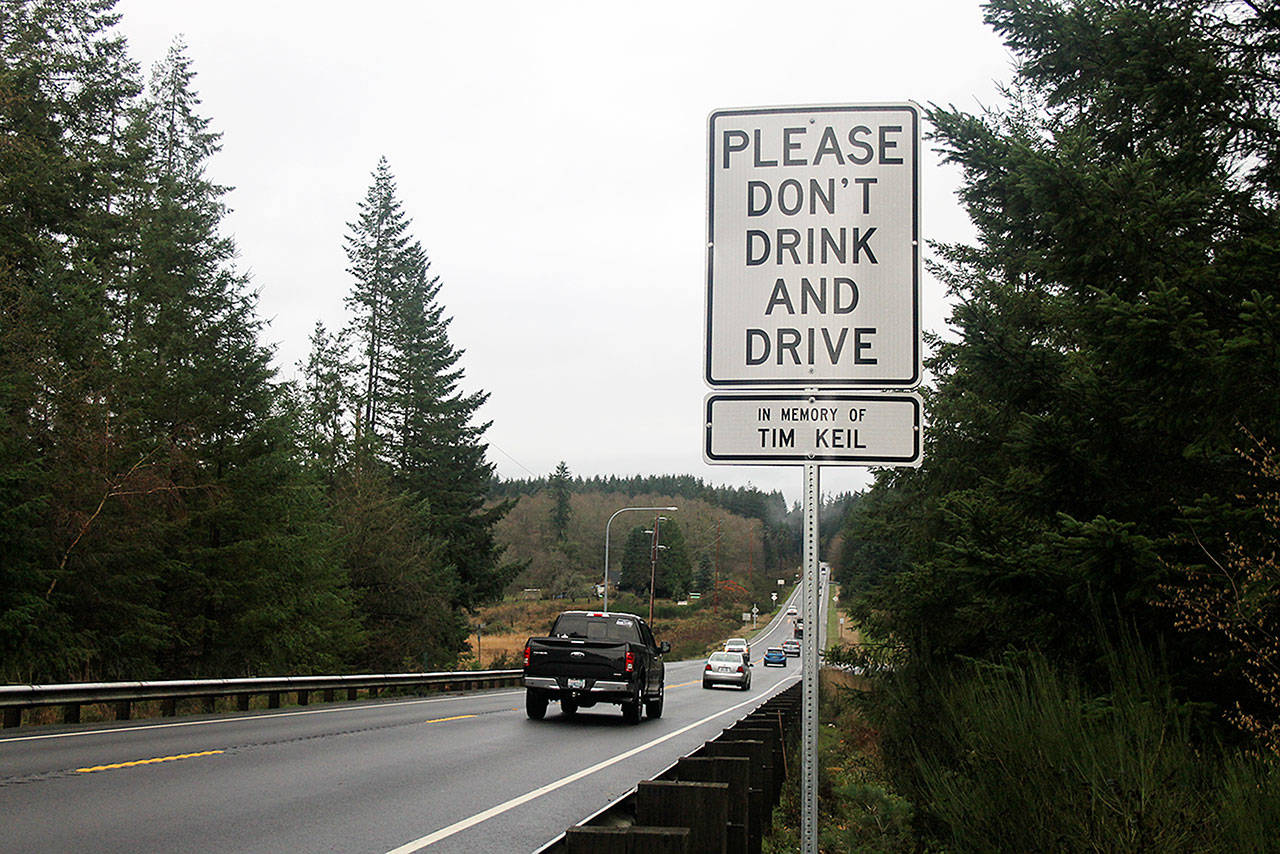Mary Jo Keil said she finds comfort in knowing her late husband’s legacy will live on, though it doesn’t mend her pain.
A memorial road sign in honor of Tim Keil was installed on Tuesday near the intersection of State Highway 525 and Coles Road, where he was killed by a drunk driver in February 2015.
Tim Keil was 61.
Though nothing can change what happened on Valentine’s Day two years ago, she hopes the sign will help prevent another from suffering a similar fate.
“It’s a reminder that Tim was killed by a drunk driver,” Mary Jo Keil said. “Time goes by and it fades from people’s minds what happened and this sign assures that Tim’s death wasn’t in vain. It keeps it alive. It’s very comforting to me. It allows the grieving process to move along, as slowly as it is.”
The sign was created through the state Department of Transportation’s DUI Memorial Sign Program. The grassroots program, originally started by family and friends, of victims of drunk drivers aims to curtail driving under the influence.
Signs can be installed whenever the causing driver is convicted of vehicular homicide or fatally injured and later shown to have been impaired through toxicology results.
The double-sided sign, 3 feet wide and 5 feet tall, cost $750, though Trinity Lutheran Church paid the majority of the tab; Tim Keil was a member of the congregation and the His Hands Extended Program, which takes clothing to the homeless in Seattle.
About 25 people attended a ceremony on Tuesday in Bayview to commemorate the sign’s installation and honor his memory. It was too dangerous for a public gathering on the busy road. Instead, they met at the Bayview Park and Ride to take turns sharing fond memories of him.
Keil’s daughter, Angie Johnson of Kenmore, said she appreciated the outpouring of support at the ceremony.
“It was a testimony to how many people’s lives he touched,” Johnson said. “Everyone there just spoke about how much they missed him and impacted upon their lives. He touched each person individually and he loved everyone no matter what. He never judged anyone.”
“It was like he was put on this earth to help people and he will be missed,” she added.
Jim Lindus, pastor at Trinity Lutheran Church in Freeland, spoke about Tim Keil’s kindhearted nature at the ceremony.
“I want to remember the way he lived, not the way he died,” Lindus said in a phone interview Friday morning. “And just give thanks to the person he was. He was a big-hearted teddy bear and a good guy. The end was very tragic, but his life was very beautiful.”
Lindus hopes the sign will serve two functions: reminding people not to drink and drive and to be sincere when saying goodbye to loved ones because “it could be the last time.”
Slow as the wheels of justice may be, Johnson said she too feels the sign brings solace.
“It definitely brings comfort to me,” Johnson said. “I feel like he’s being honored in that way. I also feel like it’s just the beginning of justice being served. There’s a still a long way to go. But, it definitely is the beginning. I hope it brings awareness to people that getting in your car after drinking can kill someone.”
Despite being found guilty of vehicular homicide in December 2016 and sentenced to 126 months in prison, Michelle Nichols has not yet served a day in jail. A judge-approved deal that was supposed to expedite the trial and the defense’s pre-planned appeal has dragged on for the past 11 months.
“I was told by the prosecutor’s office that this could go on for many more months,” Mary Jo Keil said. “That would put it well beyond three years since Tim was killed and she has not gone to prison.”
The next step in the appeal process is currently underway. The Island County Prosecutor’s Office has until Dec. 22 to respond to the defense’s brief. Once submitted, the defense has 30 days to file a reply.
The defense argues that police obtaining toxicology results from Nichols’ blood without a warrant was unjustified. One of two outcomes are possible when it comes back to Island County Superior Court, depending on the appeals court’s ruling: a new trial without the toxicology results — the prosecution’s key piece of evidence — or a lifting of Nichols’ stay of sentencing. The latter result would send Nichols to prison.
Nichols is currently required to wear an electronic bracelet that prohibits her from consuming alcohol.
The prolonged nature of the appeals process has been painful for Mary Jo Keil and Johnson. But, once it’s completed and she has more time to heal, Mary Jo Keil will turn her attention to making a difference.
She plans to advocate for stricter impaired driving policies with Mothers Against Drunk Drivers, a national group aiming to stop driving under the influence and support those affected by it.
“I’m still in the process of grief, but I’m ready to advocate for it,” Keil said. “… At that point in time, I’ll feel somewhat relieved of the results of what happened, the negativity, the grief, the sorrow, the pain, in order to look at ways to further the message and be a source that somebody else can lean on that maybe going through the same thing.”
One of Keil’s goals is to improve the enforcement of sobriety checkpoints. According to the non-profit organization’s website, the Centers for Disease Control and Prevention found that well-publicized sobriety checkpoints can reduce alcohol-related crashes and fatalities by more than 20 percent.
There are 37 states, plus Washington D.C., that utilize sobriety checkpoints. Washington is not among them.




